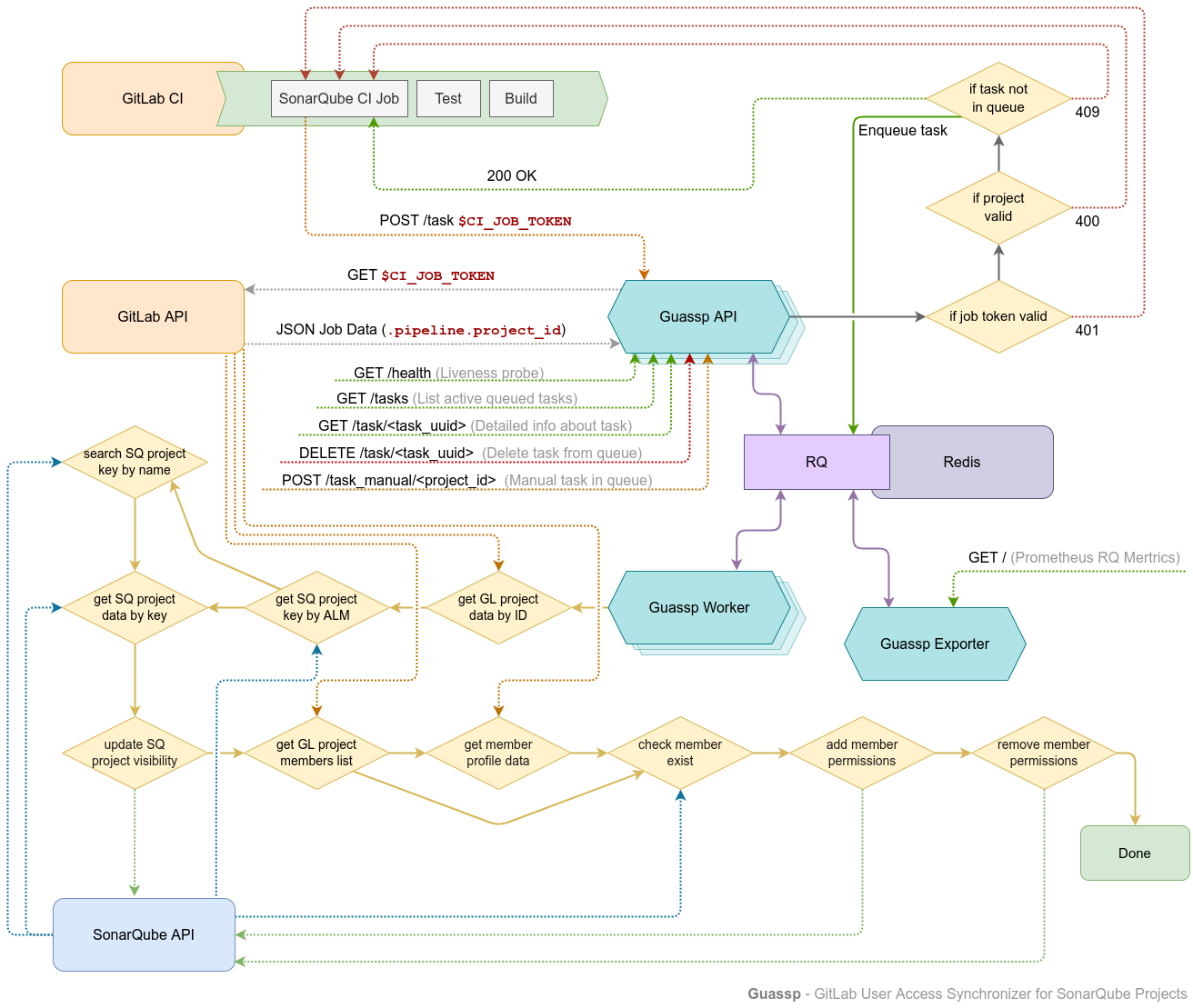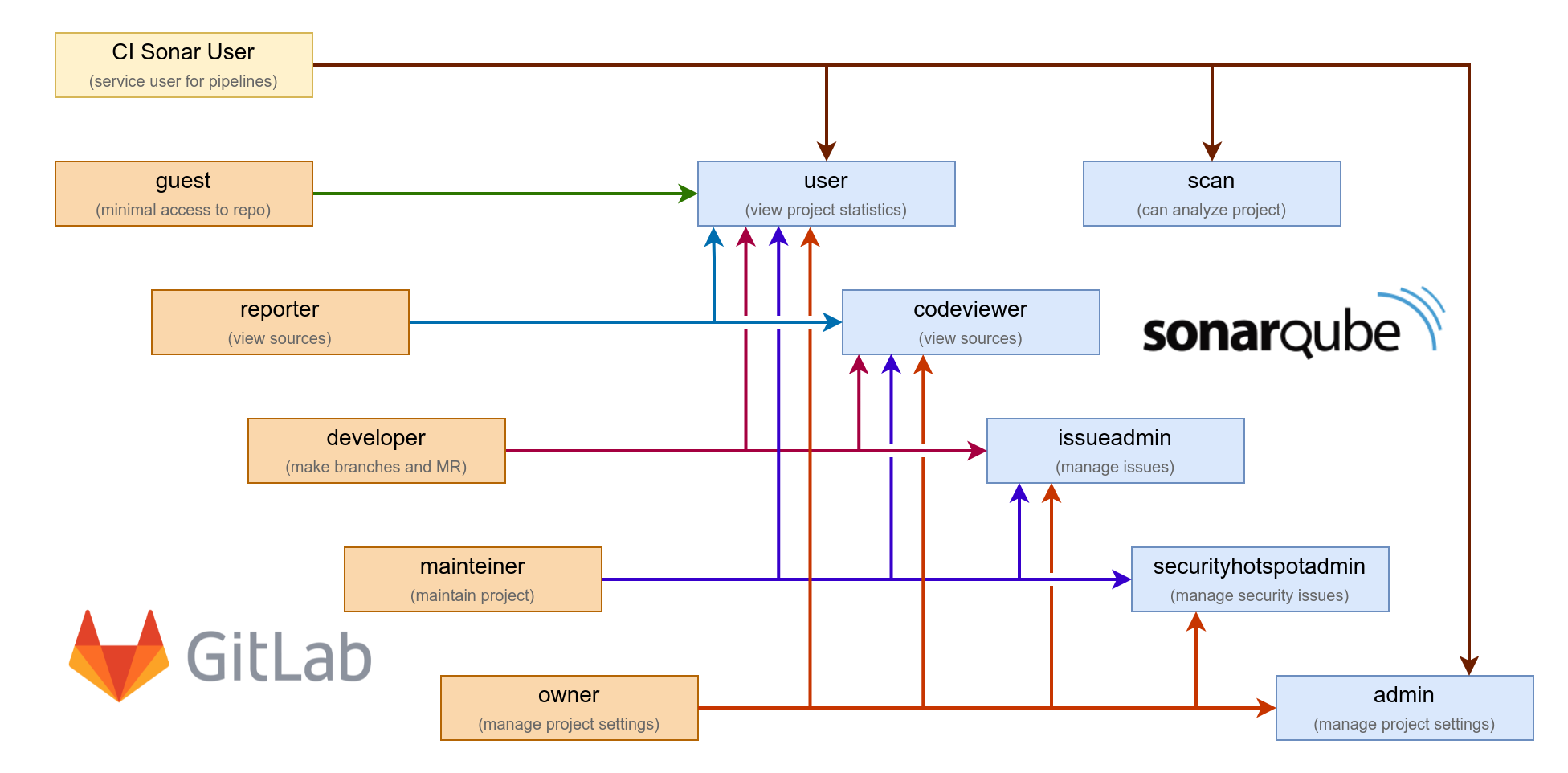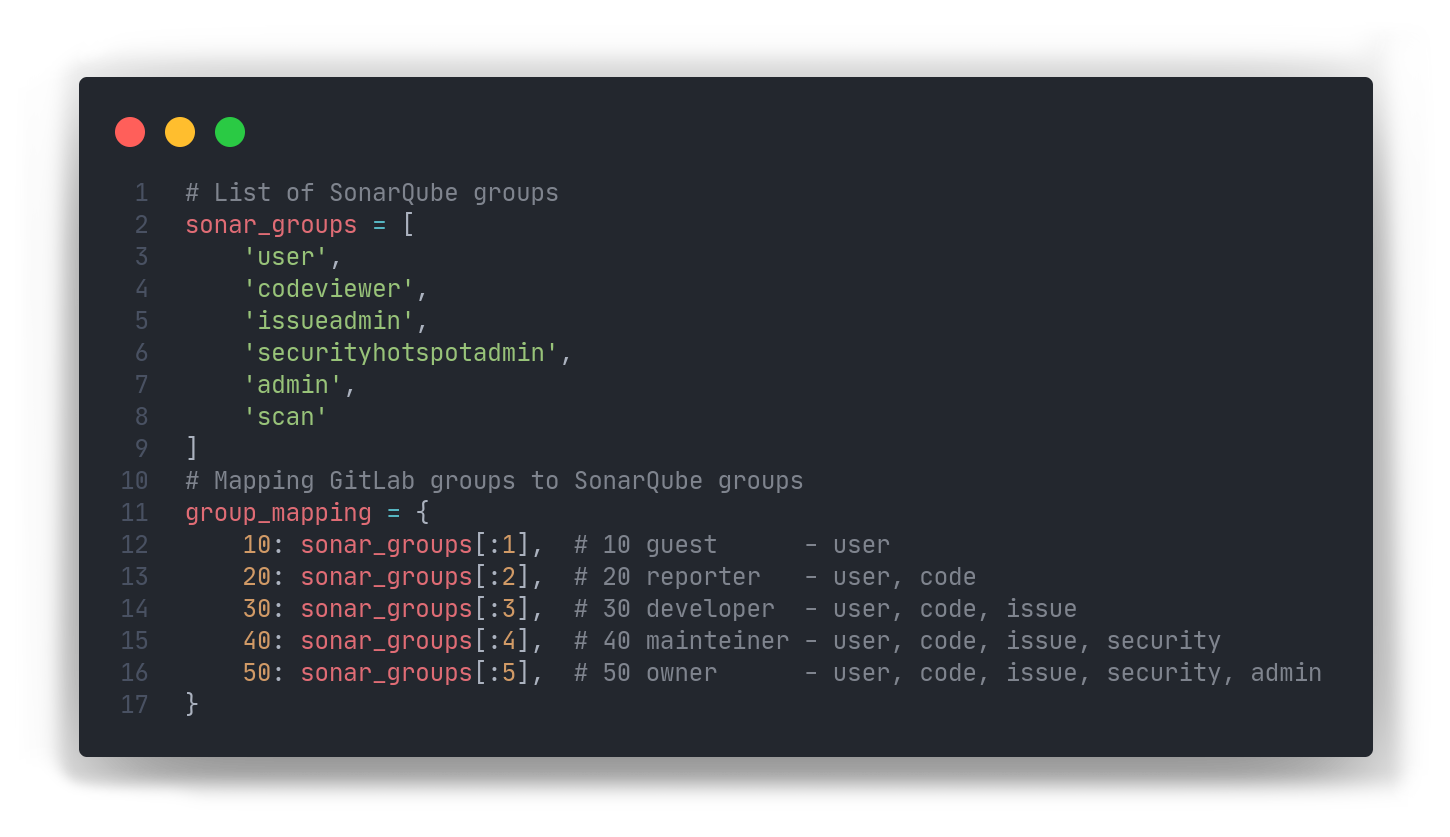guassp
Guassp - GitLab User Access Synchronizer for SonarQube Projects
The project is intended to create a multi-user integration of SonarQube and GitLab. Project visibility and user permissions will be set in SonarQube in the same way as project permissions in GitLab.
This document is available in languages: eng 🇬🇧, ua 🇺🇦, rus 🇷🇺
- Implementation
- Requirements
- Components
- Container image
- Quick start
- Configuration
- API
- Pipeline
- Metrics
- Building and Debugging
Implementation
This utility consists of a front-end API that accepts requests to update
permissions from the GitLab CI pipeline, where all trust is built around
CI_JOB_TOKEN, trusted tasks are added to the RQ job queue (Redis Queue).
Jobs are processed by the backend workers, and a separate prometheus metrics
exporter is used to display statistics.

Permissions are divided by the access level of SonarQube roles according to
the interests of group users in GitLab.
It takes into account how GitLab implements user access rights in the
project, and users from invited groups, where access levels are limited
in accordance with GitLab.


Requirements
Necessarily
- SonarQube must have configured [ALM][] integration with your GitLab, and you
must specify the name of the integration key in
SONARQUBE_ALM_KEY; - Authentication in SonarQube must occur only through [ALM][] GitLab, otherwise the search for users will be violated, the rights are synchronized only for the explicitly corresponding account that came from GitLab;
- You must be able to provide an access token with administrative privileges to
SonarQube in
SONARQUBE_TOKENfor the worker to work correctly; - You must create a service user in GitLab, which must have at least
developer access in all projects that you want to analyze in SonarQube,
with this user you must log in to SonarQube and give him global rights to
perform analysis and create projects. Then you can use that user’s token:
- User token received in SonarQube as
SONARQUBE_TOKENused in CI pipeline to perform analysis and project management. - User token received in GitLab as
GITLAB_TOKENfor worker, needed to get a list of all members of a group or project, including inherited and invited members
- User token received in SonarQube as
- The name of the project registered in SonarQube must be equal to
$CI_PROJECT_NAMESPACE/$CI_PROJECT_NAMEand the project key is recommended to be set togitlab:$CI_PROJECT_ID. Only with these settings, synchronization will be successful, other states are possible but have not been tested.
Recommended
- The best experience will be gained by using the sonarqube-community-branch-plugin plugin which adds branch analysis and PR support to your projects. Also here you will need a previously created system user in GitLab with developer rights, which will allow you to decorate MR in your projects.
- For transparent integration, it is best to use the example script sq-integration-taks for the GitLab CI pipeline, otherwise other project registration options may not work correctly or even break the work. The example is also tailored for the presence of the sonarqube-community-branch-plugin plugin and the execution of OWASP DependencyCheck
- Use Prometheus and Grafana metrics to analyze synchronizer performance.
Components
The project is implemented on flask, for WSGI it is used bjoern, the work with the GitLab API is done through python-gitlab, and the SonarQube API through python-sonarqube-api. To process the message queue, RQ is used, whose metrics are returned by rq-exporter.
Container image
You can pull image from registries:
ghcr.io/woozymasta/guassp:latestquay.io/woozymasta/guassp:latestdocker.io/woozymasta/guassp:latest
Quick start
For a quick start, you can use the example from docker-compose:
- docker-compose.env - change the settings in the environment file
- docker-compose.yml - run with
docker-compose up -d
Configuration
To launch the desired utility, transfer to the container or script
guassp.sh argument:
worker(default) - task handler from the queueapi- API to control tasksexporter- Prometheus metricall-in-one- Launchworker,apiandexporterimmediatelyapi-dev- Launching API via Flask DEV server
Application Options
LISTEN_ADDRESS=0.0.0.0- API listen addressLISTEN_PORT=5000- API listen portLOG_LEVEL=INFO- Logging levelSECRET_KEY=secret- Secret keyQUEUE_RESULT_TTL=7200- Queue result storage timeMORE_ACCURATE_SYNC=true- Search users in SonarQube by GitLab email else by username. It call one more API request per user is more accurate but slower x2
Options for working with GitLab
GITLAB_URL=https://gitlab.com- GitLab server URLGITLAB_TOKEN- GitLab access token, must have permissions to view contributors and their permissions for maintained projectsGITLAB_SKIP_USERS- comma-separated list of GitLab user IDs that will be skipped during synchronization
Options for working with SonarQube
SONARQUBE_URL- SonarQube server URLSONARQUBE_TOKEN- access token to SonarQube with administrative privilegesSONARQUBE_ALM_KEY- [ALM][] key GitLab integration nameSONARQUBE_SKIP_GROUPS- comma-separated list of SonarQube groups that will be skipped during synchronization
Options for working with Redis
REDIS_URL=redis://localhost:6379/0- Redis server URL
Prometheus Metrics Exporter Options
EXPORTER_LISTEN_ADDRESS=0.0.0.0- Exporter listen addressEXPORTER_LISTEN_PORT=9726- Exporter listen port
Also you can pass RQ args and environment variables
API
Job Registration
POST
/task{"job_token": str}Headers:
JOB-TOKENorAuthorization: Bearer
You need to pass the task token in any of the options:
curl -sL http://127.0.0.1:5000/task \
-H "Content-Type: application/json" \
-d '{"job_token": "'$CI_JOB_TOKEN'"}' | jq
curl -sL http://127.0.0.1:5000/task -X POST \
-H "JOB-TOKEN: $CI_JOB_TOKEN" | jq
curl -sL http://127.0.0.1:5000/task -X POST \
-H "Authorization: Bearer $CI_JOB_TOKEN" | jq
The task token can be passed in the JOB-TOKEN header, or
Authorization: Bearer or be the value of the job_token key in JSON
Tasks Queue
GET
/tasks
curl -sL http://127.0.0.1:5000/tasks | jq
curl -sL http://127.0.0.1:5000/tasks | jq -er '.tasks | keys'
Task Status
GET
/task/<uuid:job_uuid>
curl -sL http://127.0.0.1:5000/task/8b155172-cfcf-4777-b9f4-bfce53b6eb0e | jq
Removing a task from the queue
DELETE
/task/<uuid:job_uuid>
curl -sL http://127.0.0.1:5000/task/8b155172-cfcf-4777-b9f4-bfce53b6eb0e \
-X DELETE | jq
Manual task registration by GitLab project ID
POST
/task_manual/<int:prj_id>
curl -sL http://127.0.0.1:5000/task_manual/111 \
-X POST | jq
Health
GET
/health
API health, application availability and job queues.
Pipeline
In the GitLab CI pipeline, first of all, you must make sure that the [ALM][] setup is done and refers to your project, after which you can submit a task for synchronization in guassp. Now you can start the analysis.
For publish Guassp API behind Nginx as part of SonarQube API check Nginx config example
: "${SONARQUBE_PROJECT_KEY:=gitlab:$CI_PROJECT_ID}"
curl --location --fail --user "$SONARQUBE_TOKEN:" \
"$SONARQUBE_URL/api/alm_settings/set_gitlab_binding" \
-d "almSetting=$SONARQUBE_ALM_NAME" \
-d "project=$SONARQUBE_PROJECT_KEY" \
-d "repository=$CI_PROJECT_ID"
curl --location --fail -X POST -H "JOB-TOKEN: $CI_JOB_TOKEN" \
"$SONARQUBE_URL/api/guassp/task"
You can see a more voluminous example of a script for executing SonarQube
in the pipeline in the sq-integration-taks.sh file
Metrics
Metrics implemented using project rq-exporter
Dashboard ID 12196 is suitable for visualization in Grafana or use it
adaptation which will output only metrics from guassp.
Building and Debugging
A set of commands for fast local debugging in container
# Build
podman build -t guassp .
# Redis
podman run --rm -d -p 6379:6379 --name redis redis
# API
podman run --rm -d -p 5000:5000 --env-file .env --name guassp-api localhost/guassp:latest api
# Workers
podman run --rm -d --env-file .env --name guassp-worker-1 localhost/guassp:latest worker
podman run --rm -d --env-file .env --name guassp-worker-2 localhost/guassp:latest worker
# Exporter
podman run --rm -d -p 9726:9726 --env-file .env --name guassp-exporter localhost/guassp:latest exporter
# Check
curl 0.0.0.0:9726 -s | grep -v '^#'
curl 0.0.0.0:5000/tasks -s | jq
curl 0.0.0.0:5000/task -s -X POST -H "JOB-TOKEN: $CI_JOB_TOKEN" | jq
Or run locally, for this you need to install dependencies
apt-get install -y libev-dev libevdev2
python -m venv .venv
./.venv/bin/activate
pip install requirements.txt
And for simplicity, run through a script guassp
./guassp.sh api
./guassp.sh worker
./guassp.sh exporter